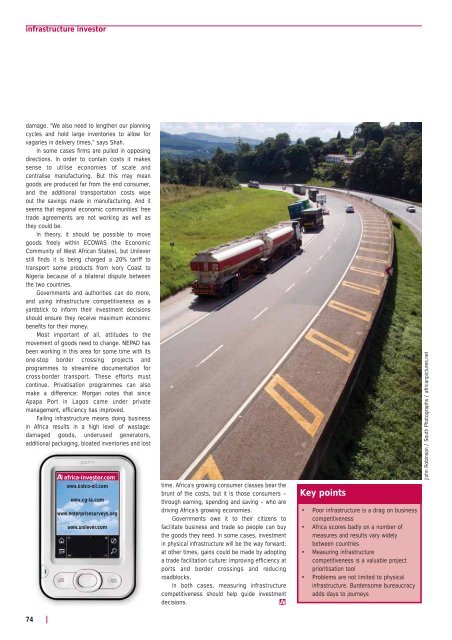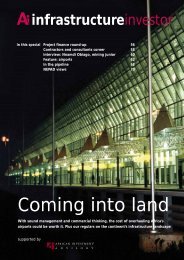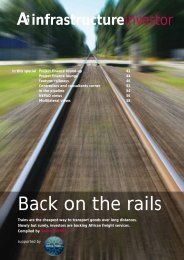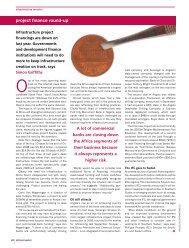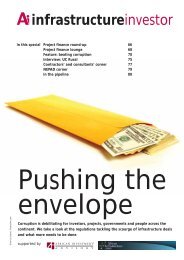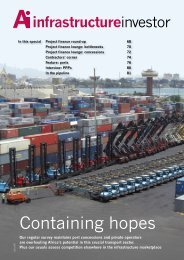Infrastructure investor May 2008 - Simon Griffiths
Infrastructure investor May 2008 - Simon Griffiths
Infrastructure investor May 2008 - Simon Griffiths
You also want an ePaper? Increase the reach of your titles
YUMPU automatically turns print PDFs into web optimized ePapers that Google loves.
infrastructure <strong>investor</strong>damage. “We also need to lengthen our planningcycles and hold large inventories to allow forvagaries in delivery times,” says Shah.In some cases firms are pulled in opposingdirections. In order to contain costs it makessense to utilise economies of scale andcentralise manufacturing. But this may meangoods are produced far from the end consumer,and the additional transportation costs wipeout the savings made in manufacturing. And itseems that regional economic communities’ freetrade agreements are not working as well asthey could be.In theory, it should be possible to movegoods freely within ECOWAS (the EconomicCommunity of West African States), but Unileverstill finds it is being charged a 20% tariff totransport some products from Ivory Coast toNigeria because of a bilateral dispute betweenthe two countries.Governments and authorities can do more,and using infrastructure competitiveness as ayardstick to inform their investment decisionsshould ensure they receive maximum economicbenefits for their money.Most important of all, attitudes to themovement of goods need to change. NEPAD hasbeen working in this area for some time with itsone-stop border crossing projects andprogrammes to streamline documentation forcross-border transport. These efforts mustcontinue. Privatisation programmes can alsomake a difference: Morgan notes that sinceApapa Port in Lagos came under privatemanagement, efficiency has improved.Failing infrastructure means doing businessin Africa results in a high level of wastage:damaged goods, underused generators,additional packaging, bloated inventories and lostafrica-<strong>investor</strong>.comwww.bidco-oil.comwww.cg-la.comwww.enterprisesurveys.orgwww.unilever.comtime. Africa’s growing consumer classes bear thebrunt of the costs, but it is those consumers –through earning, spending and saving – who aredriving Africa’s growing economies.Governments owe it to their citizens tofacilitate business and trade so people can buythe goods they need. In some cases, investmentin physical infrastructure will be the way forward;at other times, gains could be made by adoptinga trade facilitation culture: improving efficiency atports and border crossings and reducingroadblocks.In both cases, measuring infrastructurecompetitiveness should help guide investmentdecisions.Key points• Poor infrastructure is a drag on businesscompetitiveness• Africa scores badly on a number ofmeasures and results vary widelybetween countries• Measuring infrastructurecompetitiveness is a valuable projectprioritisation tool• Problems are not limited to physicalinfrastructure. Burdensome bureaucracyadds days to journeysJohn Robinson / South Photographs / africanpictures.net74


